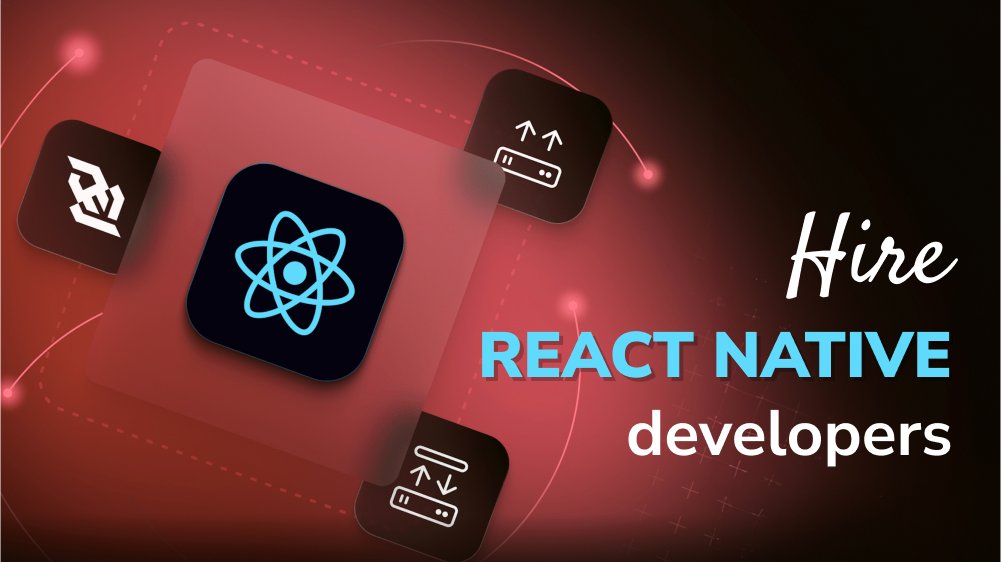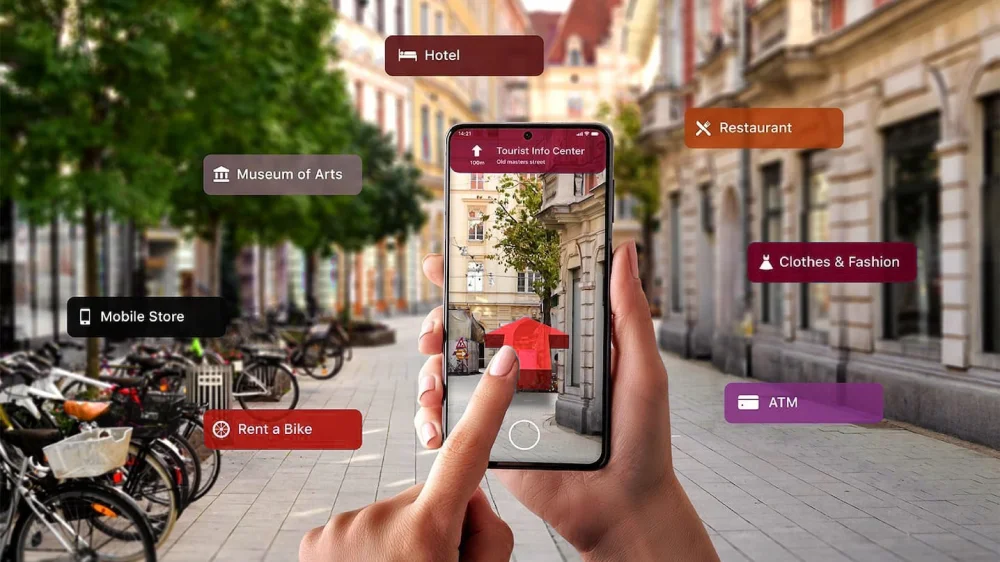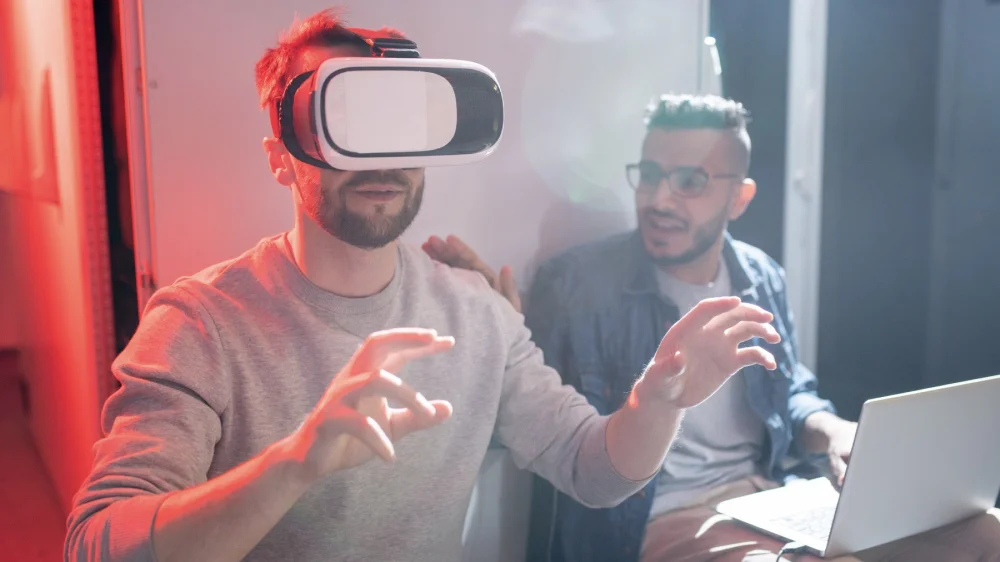
From Skills to Salary: Everything You Need to Know About Being an Augmented Reality Developer

Content Map
More chaptersThe advancements in augmented reality (AR), virtual reality (VR), and extended reality (XR) are unlocking unprecedented potential, not only in the entertainment world but also in almost every other field. It is changing the way we enjoy media, train in professional fields, and even perform medical procedures.
If you are intrigued by AR’s prospects and how it is changing the world, a career as an AR developer might be the right one for you. In this comprehensive article, you will gain valuable insights into the realm of AR software engineering and learn how to kick-start a successful career in this field.
Key Takeaways:
- Augmented reality developers work on developing, maintaining, and crafting an immersive and engaging user experience.
- AR developers can choose to work in multiple sectors other than the gaming industry.
- Aspiring developers need to master foundational programming and 3D modeling skills.
What Is Augmented Reality?

Augmented Reality or AR is a technology that enhances real-world environments by overlaying computer-generated graphics, animations, and other sensory inputs. AR developers create and maintain these interactive experiences for various platforms, focusing on integrating digital content with the real world. This technology allows users to experience a blend of virtual and physical elements and interact with transformed surroundings.
What Do Augmented Reality Developers Do?

Augmented Reality Developers Main Tasks
Even though every AR developer position is a little different, their main tasks involve the following common activities:
Create and Maintain AR Applications

- Selecting AR platforms. AR developers must decide which platforms, tools, and SDKs (software development kits) to work with based on project requirements. Common platforms involved in this process include Unity, AR Core or Unreal Engine.
- Software development. The main task of AR developers is to develop AR software. They handle the process of writing code, implement functions and ensure optimum performance for the most immersive experience.
- Integration. A large part of AR software development is the integration of various components of 3D assets, audio, and external APIs into AR apps. The process often goes through strict testing to ensure its performance on different devices and platforms.
Crafting Interactive Experiences
- User experience (UX) design. Augmented reality development is all about creating engaging user interfaces and interactions. Developers need to make sure users can navigate and interact in the virtual world with ease.
- Performance optimization. Ensuring the best user experience means that developers constantly work on optimizing the performance for the smoothest interaction with the virtual environment. This task often involves latency reduction, working with the frame rates and most efficient algorithms.
Other Tasks
- Collaboration and communication. As with any other software development position, AR developers must work with other teams and stakeholders to deliver high-quality augmented reality applications.
- Comply with regulations. The AR development process must follow privacy and security standards while adhering to the industry’s relevant guidelines.
AR Niches
AR and VR (virtual reality) often come to mind in relation to the gaming industry. However, other AR niches are quickly emerging, opening up vast career opportunities for aspiring AR developers.
- Educational AR: AR technology has been used in educational situations to demonstrate and explain concepts through multimedia and computer-based simulations. Just imagine students taking virtual field trips to historical monuments during a history class or interacting with a geometric shape in Math class.
- Medical AR: Along with VR and mixed reality, AR is utilized in the medical field for medical training, simulation, and even treatment.
- Gaming AR: AR technology is the most well-known in the gaming industry. Intertwining the physical and digital worlds creates an innovative and immersive gaming experience. With enough experience, developers can create viral AR games like Pokemon Go.
- Industrial AR: By overlaying digital images in the physical world, industrial AR is a great tool to provide users with an immersive training experience and provide real-time insights.
AR Developers Salary Expectations
On average, AR developers make $119,000 to $211,000 a year. However, this number varies depending on several factors, like location, number of experiences, living costs, the demand and supply of AR developers, etc. Here are more examples of AR developer location-based pay.
- The United States: Ranging from $87,679 to $112,287 a year on average.
- United Kingdom: Ranging from £45,500 to €50,000 a year on average (approximately $56,085 to $53,500).
- India: Ranging from ₹2L - ₹8L, with an average of ₹ 4.0 Lakhs per year (approximately $2,600 to $10,400).
- Vietnam: On average 247,000,000 VND per year (approximately $10,621).
- References: Glassdoor, Salary.com, Salary Explorer, Talent.com. Payscale.com, ZipRecruiter.com
What Skills Do You Need to Become a Successful AR Developer?

When hiring augmented reality developers, what skills do tech companies search for? If you are an aspiring AR developer or set a goal to further enhance your already existing skills, this list of technical and soft skills is the right place to start.
Technical Skills

Unity And Unreal Engine
Both Unity and Unreal Engine are powerful game engines. Game developers use them to build VR and AR game experiences.
Unity and Unreal Engine have a large community that shares resources and supports each other. Unreal Engine has a steeper learning curve than Unity, but learning both not only increases your chances of employment but also might be the foundation for you to produce AAA-quality games in the future.
3D Graphic Basics
As augmented reality technology blends digital elements with the real-world environment, basic knowledge regarding 3D graphics is imperative. Developers need to familiarize themselves with concepts like textures, meshes, or shaders.
Unity provides users with a robust platform to integrate 3D elements into augmented reality experiences. Other 3D-related skills developers need to learn include:
- 3D Mathematics: 3D math adds depth and allows developers to add depth, position, rotate, and scale the objects, as well as shadows and lighting, to seamlessly blend the object into the real world.
- 3D Modeling Tools: As the name suggests, these tools are used to build 3D models for visually appealing assets that overlay with the physical world. Popular 3D modelling tools are Blender and Maya.
Programming Languages: C++, C#
Whether you want to become an AR game developer, participate in AR education projects, or build AR apps for better in-store shopping experiences – learning programming languages is a must. C++, C#, Java, and Swift are programming languages essential for AR development. You don’t need to be a master in every language that we mentioned, but being proficient in one of them is beneficial. Having a background in computer science is a strong starting point, but you can also learn about these programming languages from online courses.
User Interface
A strong AR app is an app with an intuitive and frictionless user interface. In-app interactions should feel natural yet engaging in order to provide users with the most immersive experience. Gestures within the application should resemble the physical world closely, allowing users to get up to speed quickly.
VR And AR SDKs
A software development kit (SDK) is a collection of tools, libraries, frameworks, and instructions that assist developers in building AR software. Choosing the suitable SDK often depends on the specific project requirement, but when it comes to essential AR development tools, software engineers need to understand the fundamentals of ARCore and Vuforia.
Spatial Audios
Another underlying technology for AR that an established software engineer must grasp is spatial audio. The proper use of spatial audio makes a compelling and realistic experience for users through headphones and speakers.
Soft Skills
Successful developers also possess a set of desired soft skills.
- Communication: This refers not only to the ability to convey ideas but also great listening skills to ensure everyone has the same goal in mind, minimizing bottlenecks and reworks.
- Collaboration: Possessing strong communication skills often goes hand-in-hand with good collaboration skills. More than submitting the work within the required time frame, this skill refers to the capability to give and receive constructive feedback, and strong time management skills to push the team forward smoothly.
- Attention to Detail: Sometimes, the small details matter and make the most natural and engaging AR experience. Hence, learn how to optimize even the smallest details to make sure you gain an advantage in today’s competitive market.
Make Your Way into the Augmented Reality World

You have worked on perfecting the foundational skills of augmented reality. The natural follow-up question is how to land a job in the tech world. Worry not; here are bite-sized steps to make your way in the augmented reality app world.
Build a Strong Portfolio
There is no better way to showcase your skills than to build a strong portfolio.
- Create a strong first impression with a professional domain name and web design.
- Include an About Me section to share your goals, achievements, and values. Include testimonials to showcase your skills.
- Select your best projects and share the story behind them. For example, what are the problems that you solved? What inspired you? Include visuals to engage viewers and potential recruiters.
- A link to your GitHub profile will demonstrate your contributions.
- Keep your portfolio updated with the newest projects and skills.
Apply for Tech Job
The next step is to apply for your (first) tech job! The Internet has made finding tech jobs so much easier.
Finding the right company for you is how you grow and elevate your career fast. Consider Orient Software as a place to grow professionally - our teammates are eager to guide you and bring out your strongest abilities!
Build Your Networks
Growing your network not only increases your employment chances but also opens up opportunities to meet with excellent mentors and colleagues. Use online communities, conferences, and hack-a-thons to your advantage and expand your network!
Conclusion
Becoming an augmented reality developer demands a serious investment of time and effort. Remind yourself that you need time and patience to become a successful AR developer, and it will be worth it in the end.
Always be on the lookout for organizations that help you advance in your career path quickly like Orient Software. Having the right team behind you can make all the difference. You are growing fast and making contributions to the field - it’s a win-win deal!






